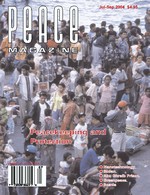
Peace Magazine Jul-Sep 2004, page 26. Some rights reserved.
Search for other articles by Rene Wadlow here
April 7th 2004 marked the 10th anniversary of the start of the genocide in Rwanda in which between 800,000 to a million persons were killed. The nature of the genocide and the lack of national responses has led to serious study within the UN system as to why preventive measures were not taken, for there were UN peace-keeping troops in the country during the lead up to the genocide. During the early months of 1994, there were daily calls of hate upon radio and written in the press. Reports on the tensions and violence in Rwanda had been presented to the UN Commission on Human Rights in Geneva. It was known to diplomatic, Church, and UN authorities in Rwanda that lists of names of those to be killed in priority were circulating to militia commanders and political groups. Thus, the genocide in Rwanda was due to a failure of properly evaluating the signs of the coming destruction of people and a lack of will to take action on the ground.
Today, in western Sudan, in Darfur, a large region the size of France, there is a situation which close observers consider to be genocidal. The UN resident co-ordinator to Sudan, Mukesh Kapila, stated that more than a million people were being affected by the violence. He stated to the BBC "It is more than just a conflict. It is an organised attempt to do away with a group of people...this is the world's greatest humanitarian crisis, and I don't know why the world isn't doing more about it."
Eight Special Rapporteurs of the Commission on Human Rights, in a rare joint appeal, called for UN action in Darfur.
In a statement to the UN Commission on Human Rights, René Wadlow stated
" We have repeatedly stressed the need for UN mechanisms to investigate serious accusations of genocide. There are serious indications of genocidal intent in the violence against the Zaghawa, Massaliet, and Fur tribal groups in Darfur. This massive violence seems not to be only the chronic clashes between farming communities and cattle herders frequent in Darfur, fuelled by rivalry over dwindling water resources and pasture caused by desertification, but also an effort to destroy the very structure of the agricultural society. Unlike the "North-South" civil war of Sudan, where differences in religion are a factor in the conflict, the Darfur struggles are between groups which are basically Muslim. While it is not the role of our Association to judge if genocide is the prime intent of the violence in Darfur, we nonetheless call for clear mechanisms now to study serious accusations of genocide."
Letters of support for speedy UN action in Darfur and the creation of permanent mechanisms to study serious accusations of genocide should be sent to the Chairman of the UN Commission on Human Rights, His Excellency Mike Smith, Commission on Human Rights, Palais des Nations, 1211 Geneva 10, Switzerland.

Peace Magazine Jul-Sep 2004, page 26. Some rights reserved.
Search for other articles by Rene Wadlow here